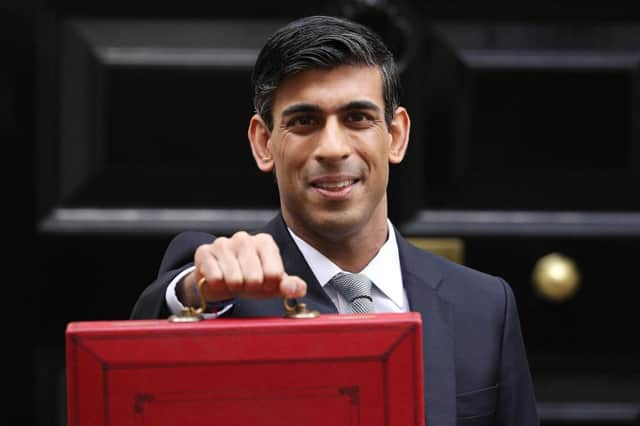Covid economic crisis: Chancellor Rishi Sunak must give the nation hope – Christine Jardine MP


Then it was confirmed that the UK economy has suffered its worst slump in any year since they began recording Gross Domestic Product (GDP) after the Second World War.
That will have come as no surprise to thousands of shops, households, small businesses, airports, large retailers, taxi-drivers, pubs, restaurants, hotels and more.
Advertisement
Hide AdAdvertisement
Hide AdThe list of those for whom the economic downturn of the past 12 months is a very personal story seems endless.
But seeing the 9.9 per cent slump confirmed by the Office for National Statistics (ONS) was still enough to induce a sharp intake of breath.
Even for those of us who judge in terms of well-being rather than numbers, it was pause for thought.
According to the ONS, it was more than double the previous annual record fall in any one year and would have been worse but for a slight bounce back in December.
And the Bank of England, who’s figures go back centuries say it’s the worst economic performance since 1709.
For most people that will be a less pressing thought than the impact it has had on their own lives. The friends and family they have lost and the challenge to their livelihood.
That is what politicians, like me, should now be focusing on as we navigate our way out of this crisis.
Three weeks from now the Chancellor will get to his feet in the House of Commons to deliver the most challenging budget in living memory.
Advertisement
Hide AdAdvertisement
Hide AdI have no doubt he will have spent this past weekend mulling over what the implications of those ONS figures are for his calculations for the coming year. They won’t be good.
As well as the highest death toll in Europe, the UK now has the worst economic performance.
Over the past 12 months we have all faced the dual challenges of the worst pandemic in modern history and the impact of a necessary lockdown with the widespread hardship it has created.
In dealing with it as an MP, I often shudder at the thought of just how bad it could have been if the UK government had not invested unprecedented, some would say eye-watering, sums of money in fighting it. Some £280 billion so far.
Even so it hasn’t been enough. Furlough is due to end too soon. Too many people have been excluded or overlooked. Too many employers who are already up against it fighting the effects of lockdown now face the double whammy of an untidy EU trade deal.
More than a decade ago, the downturn which followed the financial crash seemed like the worst possible scenario. The recession lasted from April 2008 until June 2009.
I remember watching the incredulous faces of the audience at a political conference as the former chancellor Alistair Darling outlined how he had dealt with the immediate crisis of one of the world’s biggest banks warning that they were about to run out of money.
And then there was the now infamous note left at the Treasury by an outgoing Labour minister to say that there was no money left.
Advertisement
Hide AdAdvertisement
Hide AdAt that time the Tory-led government chose austerity as the means to repair the damage to our economy. It was deemed necessary then but interest rates are now much lower.
This time surely we have to see a very different approach? We have to invest to reboot our economy and our society.
Over the next three weeks the Chancellor will be concluding his preparations, talking to interest groups and listening to the cases they put.
It is much the same for the opposition parties.
The priority of government should, for me, be the well-being of its people. And surely none of us would question that until now that has been and will continue to be tackling the virus.
The same day as the ONS issued its bad news there was a more positive message from the government. The Covid rate is beginning to come down.
But the economic challenge is not waning, and is something we can no longer afford for the Chancellor to approach with knee-jerk reactions and a patchwork of proposals with huge gaps and inconsistencies.
The country needs a single coherent, all-encompassing plan for future recovery. It has to work for business, for the self-employed and for every sector of the economy.
It also has to outline a vision of a positive future for a generation who have found their education disrupted and their employment prospects undermined.
Advertisement
Hide AdAdvertisement
Hide AdAnd for those who have seen either the career or business in which they have invested decades taken from them, there must be the promise of an alternative.
Even in this crisis there have been massive corporations who have prospered, even grown as they were able to meet the demands that other smaller retailers or business could not in the restrictions we faced. It is time surely for them to come to the plate and contribute in some way.
It will not be enough to just extend furlough for a few months again and continue with damage limitation.
Now is the time to start building the new normal that so many people have talked about over the past year.
But we have to make sure that somehow, from the rubble of this past year we create a future that is sustainable, protects the planet and creates a future that the next generations deserve.
An economy that works for everybody. Above all, the Chancellor must give people hope.
Christine Jardine is the Scottish Liberal Democrat MP for Edinburgh West
Comments
Want to join the conversation? Please or to comment on this article.